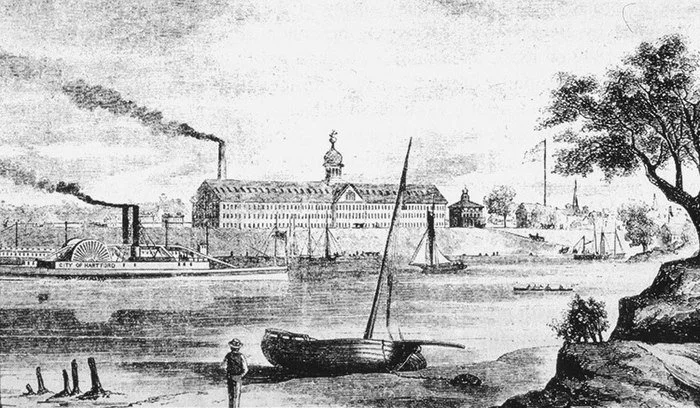
‘The true victims’
An AR-15-style rifle
— Photo by Picanox
An AR-15-style rifle is any lightweight semi-automatic rifle based on the AR-15 design of Hartford, Conn.-based Colt’s Manufacturing Co., founded in 1855. It’s a favorite weapon of mass murderers.
Colt's Armory from an 1857 engraving, as viewed from the east side of the Connecticut River.
Jim Hightower: GOP is hard at work suppressing the vote
Via OtherWords.org
At last, Nov. 6 is coming: Time to vote! Let’s all join the majestic panorama of democracy in action!
Well… calling America’s electoral process “majestic” is overdoing it, for millions of our citizens will not be allowed to vote.
That’s because a consortium of national, state, and local officials of Republican persuasion — along with their corporate ringleaders — have mounted a tawdry campaign over the past decade to slam the ballot box shut on entire segments of America’s electorate.
In a concerted effort, these rabidly partisan officials have targeted African Americans, students, Latinos, the elderly, union households, the poor, immigrants, and other communities of qualified voters to shoo them away on Election Day.
Why? Because such citizens tend to vote for Democrats and progressive ballot initiatives.
So the GOP’s grand strategy is not to “win” by getting the most votes, but to keep from losing by aggressively (and shamefully) shutting out millions of Americans who might vote against their plutocratic, autocratic, kleptocratic candidates and agenda.
Consider voting day itself. It’s a Tuesday — a workday — automatically eliminating people working two or three jobs who can’t afford to take off a couple of hours or more to get to the polls and wait in line to vote. Move elections to weekends, make it a holiday, vote by mail… make democracy easy!
Instead, in a depraved, anti-democratic grab for partisan gain, Republican officials have frenetically been planting thick briar patches of ridiculous rules, logistical barriers, intimidation tactics, ballot deceptions, and outright voter bans in targeted precincts across the country.
These thugs are stealing the people’s most valuable civic property: Our votes. Shouldn’t they at least have to wear ski masks on Election Day so everyone can see who’s doing this to us?
Jim Hightower, an OtherWords columnist, is a radio commentator, writer, and public speaker.



